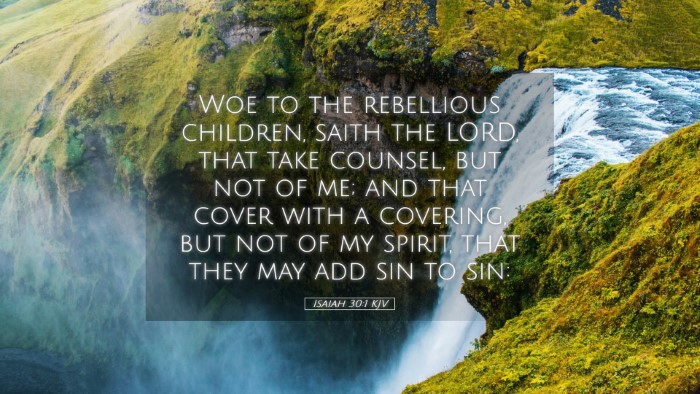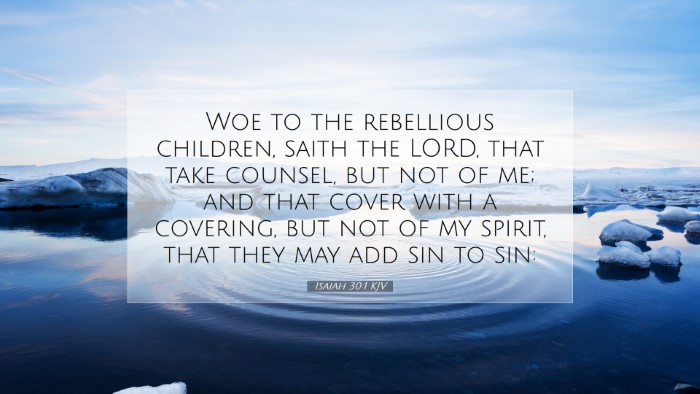Commentary on Isaiah 30:1
Verse: "Woe to the rebellious children, saith the Lord, that take counsel, but not of me; and that cover with a covering, but not of my spirit, that they may add sin to sin."
Introduction
This verse from Isaiah serves as a poignant admonition directed towards the people of Israel, characterized as "rebellious children." The prophet Isaiah conveys a divine message that highlights the folly of seeking guidance from sources apart from God. This commentary will bring together insights from renowned public domain commentaries, enriching the understanding of this powerful text.
Historical Context
The backdrop of Isaiah's prophecy is a time of political unease for Judah, marked by threats from powerful nations. The people, in their distress, sought alliances with Egypt rather than relying on divine counsel. This rebellion is both a spiritual and a practical failure, illustrating a critical turning away from God during perilous times.
Exegesis of the Text
In Isaiah 30:1, the Lord expresses His dissatisfaction with His people through a declaration of woe. This term "woe" denotes impending judgment and sorrow, indicative of the serious consequences for turning away from divine wisdom.
Woe to the Rebellious Children
- Rebellion against God: The description of the Israelites as "rebellious children" illustrates a familial relationship broken by disobedience. The usage of 'children' evokes God’s expectation of loyalty and faithfulness.
- The nature of rebellion: Matthew Henry emphasizes that rebellion against God is not merely an act of disobedience; it is a deep-seated refusal to acknowledge God's sovereignty and guidance.
The Counsel Not of Me
- Seeking earthly wisdom: The phrase "take counsel, but not of me" underscores humanity’s tendency to rely on human wisdom rather than divine insight. Albert Barnes notes that this counsel often leads one deeper into sin.
- Illusion of security: The people of Judah sought alliances with Egypt, hoping for military support, rather than trusting in God’s protection. Adam Clarke points out that this reliance on foreign powers is a reflection of a broader spiritual malaise.
Covering with a Covering
- False security: The act of "covering with a covering" signifies an attempt to shield oneself from consequences through deception or misplaced trust. Matthew Henry likens this to a superficial bandage over deeper issues.
- The danger of self-reliance: Barnes articulates the danger of leaning on temporal solutions rather than seeking refuge in the Divine. Such coverings are inadequate against the spiritual and existential realities they face.
Add Sin to Sin
- Escalation of sin: The phrase "that they may add sin to sin" indicates a progressive nature of rebellion. Adam Clarke elaborates that each wrong decision compounds the previous transgressions.
- Consequences of sin: This illustrates a moral decline that not only distances the people from God but also entraps them in a cycle of sin that is hard to break. Each wrong path leads to another, creating a dangerous trajectory away from spiritual truth.
Theological Implications
The message found in Isaiah 30:1 invites readers to consider the nature of divine guidance versus human wisdom. It challenges the reader to reflect on their own reliance on God's counsel and the spiritual pitfalls of straying from His guidance.
God's Sovereignty
This verse affirms the sovereignty of God as the ultimate counselor. The insistence on “not of me” serves as a reminder that all human wisdom is ultimately futile apart from divine revelation.
The Nature of Sin
Isaiah articulates a profound understanding of sin as not only a singular act but a cumulative process. Each act of rebellion leads further away from God and inflates the burden of guilt, underscoring the need for repentance and return to divine paths.
Application for Today
This passage speaks profoundly to contemporary believers who face similar temptations to seek guidance outside of God's word. In an age of information overload, the challenge remains to discern and prioritize divine wisdom above all else.
Call to Genuine Consultation with God
Pastors and theologians are encouraged to emphasize the importance of prayer and seeking God’s counsel in all areas of life, especially during times of crisis. It is crucial to foster a community that values divine wisdom over fleeting human solutions.
Recognizing the Danger of Sin
There is a need to educate congregations on the complexities of sin and its escalation. The peaceful assurance that comes from surrendering to God's will, rather than trusting in human reasoning or alliances, should be taught as a foundational principle of faith.
Conclusion
Isaiah 30:1 serves as a timeless warning against the dangers of rebellion and the folly of rejecting God's counsel. The insights drawn from public domain commentaries highlight the multifaceted nature of this verse, providing essential truths for pastors, students, and scholars alike. As we engage with this text, may we recommit ourselves to seek the wisdom of God above all and to live in accordance with His divine will.


